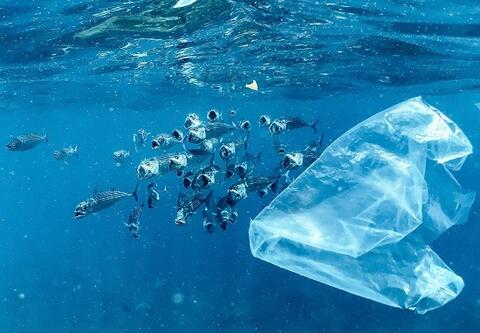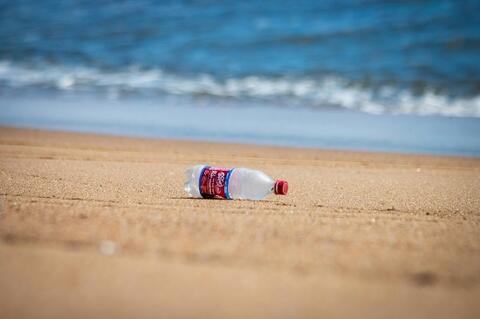
Our scientists are at the heart of negotiations for a global treaty on plastic pollution
Several researchers from Sorbonne University took part in the latest round of negotiations for a global treaty on plastic pollution, held in Busan, South Korea. The session ended without an agreement. With a final round of talks scheduled for summer 2025, scientists hope to have a stronger influence in the face of persistent oil industry lobbying.
Negotiations have yet to succeed, with the fifth and final round of talks, held in South Korea from November 25 to December 1 failing to produce a global agreement to limit plastic production. These discussions, launched two years ago under the auspices of the United Nations Environment Programme (UNEP), aim to establish a binding international treaty on plastic pollution. A previous session took place in Ottawa last April.
An important step forward
Despite the lack of an agreement, Marie-France Dignac, a senior researcher at INRAE and member of the Institute of Ecology and Environmental Sciences of Paris (IEES-Paris), affiliated with Sorbonne University, sees progress. "The Busan session showed that many countries are advocating for an ambitious treaty, especially regarding reducing plastic production. More than 100 countries support this position, which is an important step forward," says Dignac, an expert in soil pollution who attended the session.
According to UNEP data, less than 10% of the nine billion tons of plastic produced worldwide to date has been recycled. As a result, about 200 million tons of plastic waste have flowed into the oceans, creating a new ecosystem dubbed the "plastisphere." Without effective measures, UNEP estimates that plastic waste entering aquatic environments could triple by 2040.
One key measure to tackle the issue is reducing the production of virgin plastic, before it is processed into products. "Most plastic waste ends up in landfills or is incinerated," explains Jean-François Ghiglione, a marine plastic pollution specialist and research director at the Banyuls-sur-Mer Ocean Observatory (Sorbonne University/CNRS). Like Dignac, Ghiglione is part of an international coalition of scientists, a network that provides multilingual resources on the entire plastic lifecycle to inform policymakers.
Despite the lack of an agreement, Marie-France Dignac, a senior researcher at INRAE and member of the Institute of Ecology and Environmental Sciences of Paris (IEES-Paris), affiliated with Sorbonne University, sees progress. "The Busan session showed that many countries are advocating for an ambitious treaty, especially regarding reducing plastic production. More than 100 countries support this position, which is an important step forward," says Dignac, an expert in soil pollution who attended the session.
According to UNEP data, less than 10% of the nine billion tons of plastic produced worldwide to date has been recycled. As a result, about 200 million tons of plastic waste have flowed into the oceans, creating a new ecosystem dubbed the "plastisphere." Without effective measures, UNEP estimates that plastic waste entering aquatic environments could triple by 2040.
One key measure to tackle the issue is reducing the production of virgin plastic, before it is processed into products. "Most plastic waste ends up in landfills or is incinerated," explains Jean-François Ghiglione, a marine plastic pollution specialist and research director at the Banyuls-sur-Mer Ocean Observatory (Sorbonne University/CNRS). Like Dignac, Ghiglione is part of an international coalition of scientists, a network that provides multilingual resources on the entire plastic lifecycle to inform policymakers.
Up against the oil lobby
With over 400 researchers, including several from Sorbonne University such as postdoctoral researcher Gabin Colombini (IEES-Paris) and INRAE researcher Muriel Mercier-Bonin, this scientific coalition has played a critical role in the treaty negotiations. "Throughout the negotiation sessions, we’ve seen more countries refer to scientific evidence, such as the impact of microplastics on health," notes Dignac.
However, oil industry lobbying invites complicated discussions. Countries in the High Ambition Coalition — including France — which aims to drastically reduce plastic consumption and production, faced strong resistance from a small group of oil-producing nations led by Russia, Saudi Arabia, and Iran. These countries pushed to limit the treaty’s scope to waste management and recycling, rather than curbing production.
Continued advocacy
"We’d rather leave this session empty-handed than accept a weak treaty," said Sam Adu-Kami, Ghana’s chief negotiator. "We understand that negotiations with oil-producing countries are challenging, especially since over 10% of the world’s oil production is now used to make plastic. Addressing plastic pollution is a complex issue. Reconciling a profitable but polluting industry with global environmental goals is never easy," says Ghiglione.
Despite the setbacks, hope remains. The next round of talks will take place in summer 2025, with Ghiglione and Dignac participating once again. "Having gained the trust of many countries due to the scientists' independence and absence of conflicts of interest, our role remains essential in achieving an ambitious treaty and ensuring the implementation of its provisions. I will continue to advocate," Dignac asserts.

